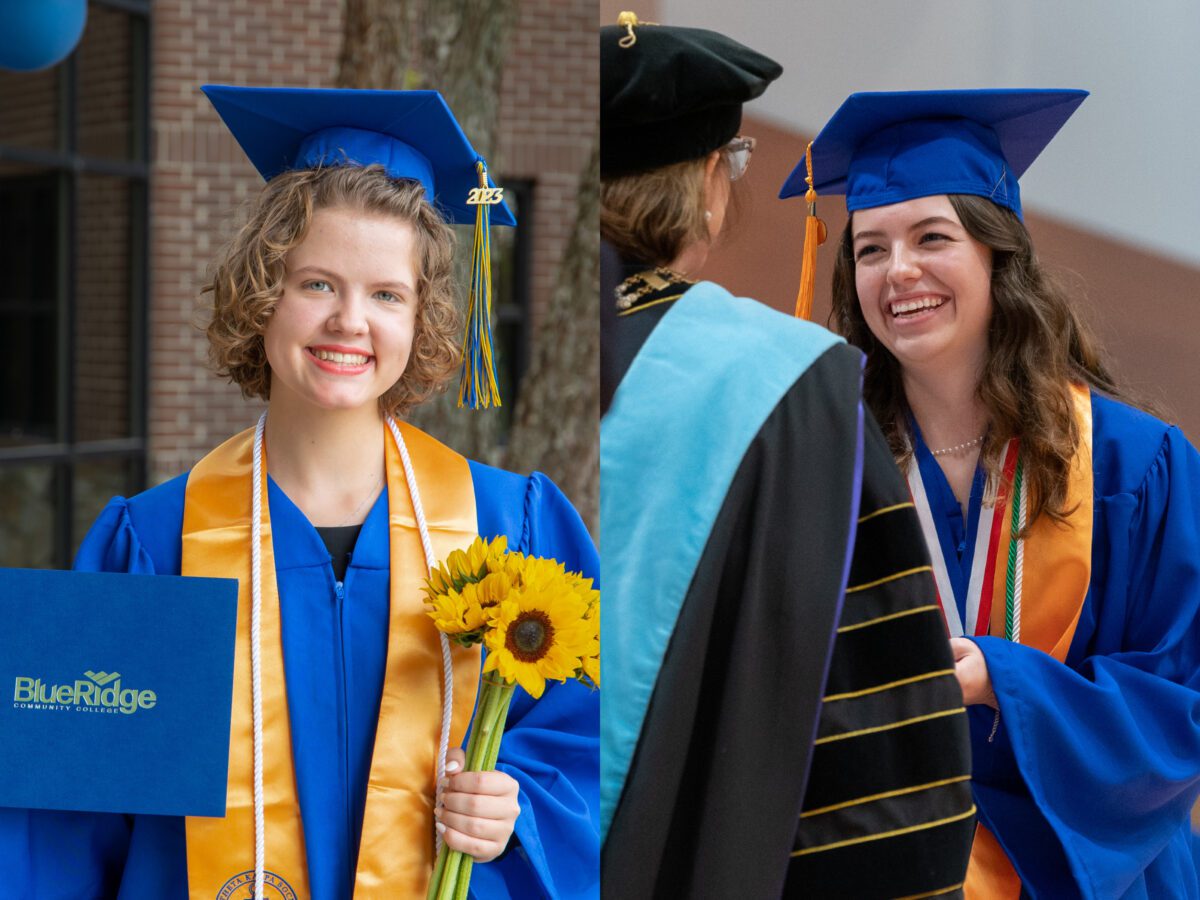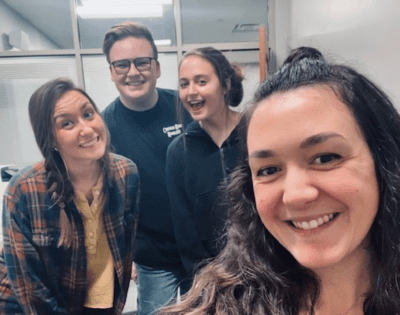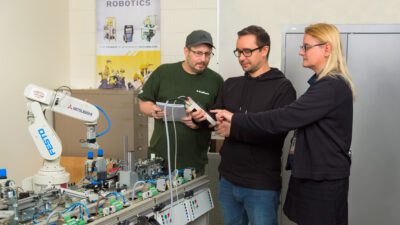

In North Carolina, high school students have the great privilege to earn college credits for free through the state’s Career and College Promise (CCP) program. Over 100 North Carolina colleges and universities have signed articulation agreements through CCP that guarantee a high school student CCP transfer credit (with a grade of C or higher). Students have the ability to earn as many as two years of college — debt-free — jumpstarting their college career or readying them to enter the workforce with skills in high-demand fields.
For those college-bound students, enrolling in CCP as a junior can lead to tens of thousands of dollars of tuition savings. Consider Blue Ridge Community College’s Academic Excellence Award winner and former CCP student Emma Robinson, who just earned two degrees at Blue Ridge and transferred over a hundred credits to Purdue University; or Berit Raines, who earned her college degree nearly a full month before graduating first in her high school class.
The Department of Public instruction shares that CCP students are 9% more likely to enroll in college after high school and that the program is particularly beneficial for underrepresented or disadvantaged groups. But according to myFutureNC, only 32% of North Carolina’s high school students are making use of the program.
With so much potential — and even the added flexibility of online classes — why are only a fraction of high schoolers taking advantage of this incredible program, particularly those coming from economically distressed communities?
CCP hurdles
North Carolina’s CCP program has three primary pathways for high school students: 1) the early college model, 2) career and technical education (CTE) courses on the community college campus, and 3) the college transfer pathway for college-bound students.
At Blue Ridge Community College, we saw untapped opportunities for our college transfer pathway in particular, and improving it meant overcoming several known challenges.
Transportation
The first hurdle is transportation. The college transfer pathway requires that either community college faculty travel to the high school for instruction or students must travel to the college campus to attend classes. The reality is that classes held away from the high school campus are simply inaccessible for some students.
Scheduling
The second hurdle is scheduling among several high schools in our service area. Each semester, classroom availability and class schedules are in flux at each high school. And when the timing of CCP classes conflicts with specialized courses like band, chorus, advanced placement classes, and many more subjects, students are forced to choose one or the other. Finally, high demand for certain CCP courses makes it tricky to assign faculty across multiple campuses.
Communication
The above challenges make consistent communication between all schools, students, parents, and faculty difficult, particularly when the details vary between semesters.
All of these factors can contribute to low enrollment, fluctuating retention, and frustration for those doing their best to participate. Fortunately, the leaders at Henderson County Public Schools (HCPS) were eager to join us in creating solutions to maximize access and opportunity for students, overcoming the known barriers of transportation, scheduling, and communication.
Rethinking the CCP Structure: A cohort model
This fall, we are piloting a new model for our College’s CCP college transfer pathway developed in partnership with HCPS: the “Blue Ridge Scholars” cohort.
The shared learning experience of a cohort is powerful. Students build relationships with one another, leading to greater social support and resilience. Furthermore, research demonstrates a cohort-based approach promotes learning and retention.
A Blue Ridge Scholar commits to a two-year pre-scheduled program, and the cohort model provides a predictable structure for all stakeholders. Through planning with parents and each high school leadership team, the CCP courses are mapped out, and other high interest courses offered through the high school are scheduled around the program.
The college courses are held in an assigned space on each high school’s campus during their first period. This intentional scheduling creates a purposeful space and time for collegiate learning, and it also provides opportunities to coordinate instruction in Spanish as needed.
In addition to graduating with college credits under their belt, each student receives a Blue Ridge Scholars cord of distinction to proudly wear on their high school graduation day.
A believer in the CCP program, HCPS Superintendent Mark R. Garrett is eager to see how our partnership will benefit his district.
“I have long known the value of the Career and College Promise program, having watched it change the trajectory of students’ lives in three separate school districts,” Garrett said. “This latest collaboration with our wonderful partners at Blue Ridge Community College enhances an already great program by eliminating barriers and complementing existing high school courses rather than competing with them. Students can set up their courses to fit their individual needs. Schools can set up their master schedules to maximize resources and provide more opportunities. It truly is a win-win for all involved, and we are excited to see the results.”
Stronger marketing
When it comes to marketing, the simpler the message, the better. We branded it the “Blue Ridge Scholars” program to set it apart from other early college options; to raise awareness about the opportunity; and to enhance the program’s identity by tying it to our respected institution.
Because the cohort model is a two-year package with a clear path to an associate degree, our guidance counselors and career coaches have found it’s easier to communicate about the program to prospective students and their parents than the traditional CCP approach. And because students who participate experience the nine course sequence with a cohort of their peers, the journey is made with the support of familiar classmates.
It’s no surprise that getting parents to the table works better than just telling students. A key element of our marketing strategy was hosting parents’ nights at each high school. At the information sessions, we presented the Blue Ridge Scholars program and its benefits, provided a FAQ handout, and reviewed the list of classes. The in-person events proved far more effective than sending emails or postal mail. Our career coaches then followed up with nearly 200 parents who attended.
Greater access for first-generation college students
At Blue Ridge Community College, we constantly work to make a high-quality higher education experience available to all. Our new cohort model for CCP provides such a bridge to the college experience, particularly for those who will be the first in their families to attend college. The simplified approach also removes financial barriers for economically disadvantaged students.
During the program, career coaches and guidance counselors come alongside families new to the college enrollment process, communicating an intentional path to an associate degree. Rather than navigating course offerings every semester, students enroll during their sophomore year and are set through graduation. Students learn important college survival skills while still in the supportive high school environment, and transportation is not an issue.
A promising start
Our innovative work with CCP is only one way we’re working to build the future workforce of our service area and beyond. We are grateful for partners like Henderson County Public Schools who eagerly collaborate to help students make the most of their education.
So far, we’re encouraged by the performance of this new CCP model and the enthusiasm we’re seeing in parents who learn about it. Nearly 70 students are enrolled in our first cohort, and our CCP enrollment is up nearly 10% over the last academic year. And this is only the beginning. We’re hopeful it’s a big step toward fulfilling the “promise” of the Career and College Promise program, opening access to successful careers for not just some students, but all.




